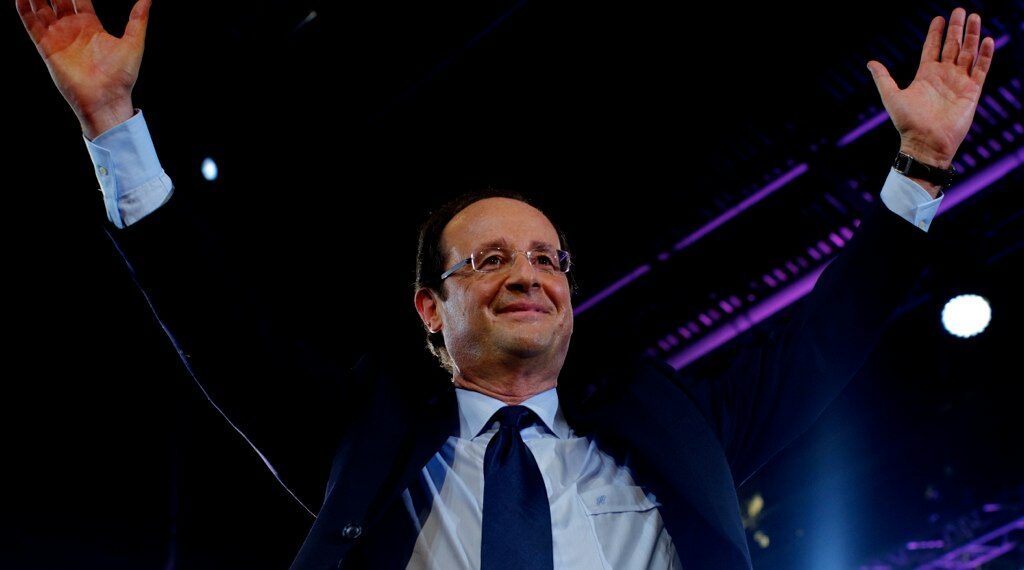
On 7 May 2012, François Hollande narrowly defeated incumbent Nicholas Sarkozy, ending 17 years of conservative presidencies in France. A month after his win, Holland’s centre-left Parti Socialiste (PS) and its allies won an overall majority in both chambers of parliament. The stage seemed set for PS to reshape France. Ten years later, those days seem remarkably distant.
PS now holds just 25 seats out of 577 in the French National Assembly. Anne Hidalgo, mayor of Paris and the PS presidential nominee, is struggling to poll higher than small communist parties; one poll placed her in eleventh place. How did this happen?
Like many stories of centre-left decline, the PS’s can be ascribed to its adoption of rightwing policies, its appointment of unpopular leaders, the loss of some of its base to the far right and factionalism. Any one of these might have been enough to spell defeat in 2017; all of them at once has decimated the party.
First, some context. Like the UK, France does not have proportional representation; MPs and the president are elected in a two-round system, with only the top few candidates going through to a run-off.
This two-round system has left the PS watching from the sidelines more than once, but in 2012 they triumphed. Yet the millions of voters who had elected them quickly become disillusioned. Hollande, elected on a program of taxing the rich and supporting trade unions, pursued multiple labour reforms that weakened trade unions, raised workers’ pension contributions and made it easier for firms to sack workers – reforms that were bitterly opposed by his own base and the public.
“[Hollande] is supposed to be on the left,” one disillusioned trade unionist told the Financial Times. He wasn’t the only one: barely halfway through Hollande’s term, the PS had fallen to third place in the European elections; just 53% of Hollande voters backed his party in those elections.
This alienation of the PS base had disastrous consequences: in 2017, more Hollande 2012 voters backed leftist Jean-Luc Mélenchon (24%) than backed Hollande’s own party (15%).
Yet it was not simply the PS’s policy choices that alienated their voters; their choice of president also massively damaged their popularity. Hollande saw his approval ratings decline dramatically over the course of his presidency; by late 2016, just 4% of voters approved of him, making him less popular in France than Vladimir Putin.
This was the result not only of Hollande’s controversial policies but his spicy takes. In 2016, a book by two French journalists entitled A President Shouldn’t Say That revealed a series of quotes from Hollande in which he suggested the French judiciary was full of “cowards” and that footballers need “brain-building”, that Sarkozy was a “crude mini-De Gaulle” and a “Duracell rabbit” and the Green party a “cynical pain in the butt”. Hollande even insulted his own ministers.
Although Hollande ultimately chose not to run for re-election, the damage had been done. Some switched to leftwing parties, but others went in the opposite direction: the far-right National Front (FN) surged during Hollande’s presidency, its growth ascribed to economic decline, the effects of globalisation, opposition to immigration and rising Islamophobia.
Not only did the PS do little to respond to these issues, it exacerbated them. Under Hollande, unemployment rose to 10%, while the president declared that his country had “a problem with Islam” and declined to repeal his predecessor’s burqa ban. Predictably, the PS’s refusal to oppose Islamophobia did not weaken the far right: FN candidate Marine Le Pen’s support amongst workers grew from 25% in 2012 to 39% in 2017.
The final cause of PS’s collapse was a damaging party split precipitated by Emmanuel Macron’s decision to mount an independent bid for the presidency. Macron, a centrist who had served in Hollande’s cabinet, declined to participate in the PS primary and instead ran under the banner of his own party, En Marche.
Multiple senior PS officials backed Macron over the PS candidate Benoit Hamon, including former prime minister Manuel Valls, Lyon mayor Gérard Collomb, former Paris mayor Bertrand Delanoë and multiple MPs. Most PS voters followed them: 47% of those who voted for Hollande in 2012 went on to cast their first-round ballot for Macron in 2017. Just 15% voted for Hamon.
All these factors – a disillusioned base, a profoundly unpopular incumbent, a resurgent far right and a divided party – combined to deliver the PS its worst-ever result. Five years on, the party has yet to recover. In the 2019 EU elections, it fell back further; ahead of the 2022 race, the party seriously considered not running due to a lack of funds.
The PS is unlikely to vanish in the immediate future; the nature of France’s two-round system and the tendency of parties to form alliances mean that they will probably hold on to a medium-sized group of MPs. But the PS collapse remains a cautionary tale for parties of the centre-left. Alienating your base, pushing rightwing policies and failing to challenge far-right rhetoric can have dire consequences – and a divided party will not succeed.
Ell Folan is the founder of Stats for Lefties.


